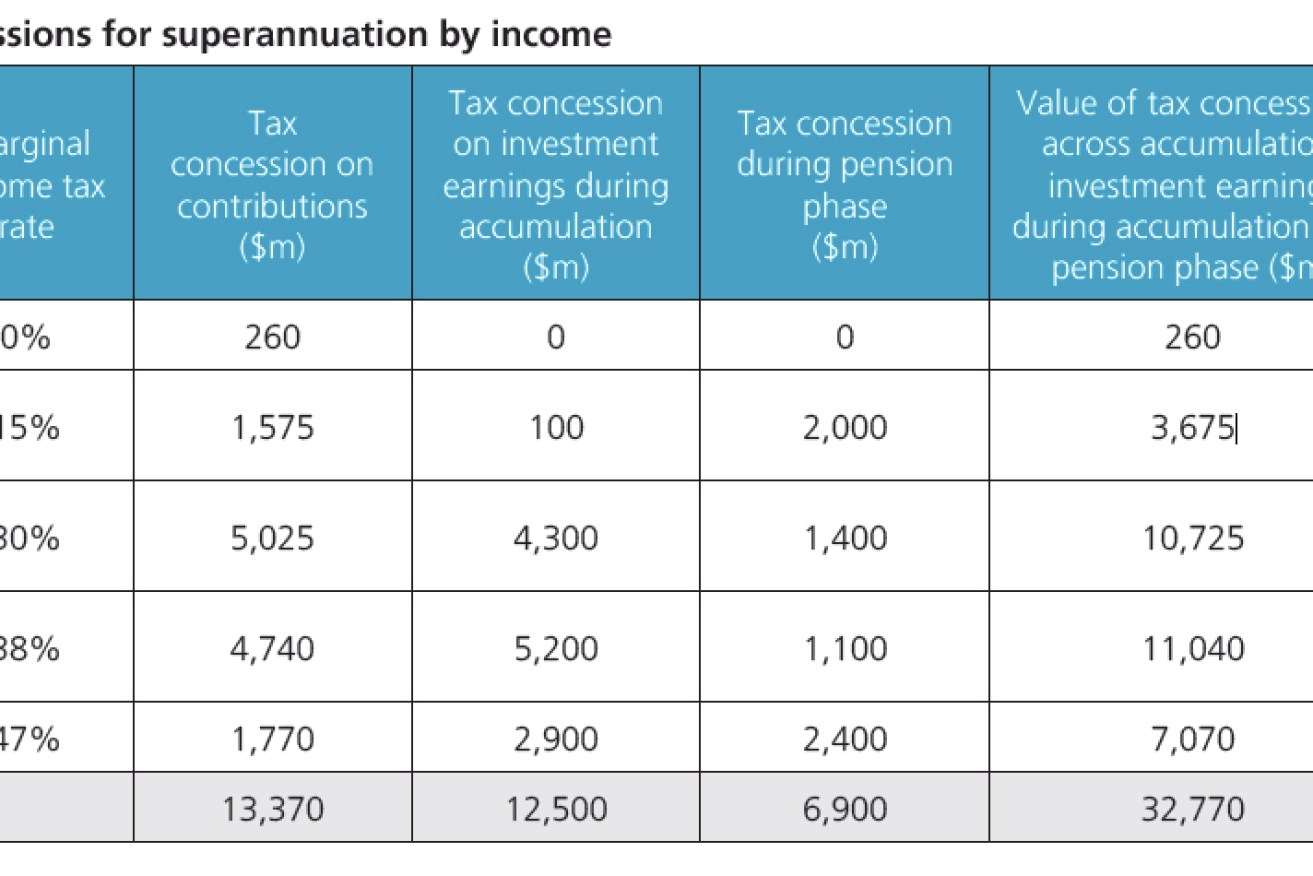Super industry calls for review of tax breaks

sss
The government is sending out mixed signals on where it stands on the sensitive issue of superannuation tax concessions.
Last month, Prime Minister Tony Abbott promised that superannuation tax breaks would not be watered down before and beyond the next election, but Social Services Minister Scott Morrison later said the super system is being exploited by the wealthy for estate planning purposes.
A logical extension of Mr Morrison’s position is that the limitless tax concessions on superannuation earnings need to be tightened.
• No change to super drawdown: Morrison
• Why Scott Morrison is right about super tax
• Why Frydenberg is wrong about super tax
• Labor’s super tax a gift to the rich
According to Treasury estimates, the tax breaks are set to cost the federal government more than $40 billion in foregone revenue this year. Around $25 billion of this will be attributable to the tax-free earnings of retirees and about $17 billion will be linked to the concessional 15 per cent tax rate on contributions to super accounts.

ASFA CEO Pauline Vamos.
The Association of Superannuation Funds of Australia – the super sector’s peak body that counts industry funds, retail funds and government super schemes as members – disputes the Treasury findings.
ASFA argues that the method used by Treasury to calculate foregone taxes as a result of the concessions does not take into account the benefits of the tax breaks, particularly in reducing the reliance of retirees on the age pension.
However, in its submission to the tax inquiry this week ASFA has acknowledged that the existing tax regime can be exploited by the wealthy for “estate planning purposes”, and might be delivering disproportionate benefits to high-income earners.
“It is important to note that the vast majority of members do and will use the system for its intended purpose,” ASFA states in its submission.
“However, there is a small minority of people that can use the system for estate planning and unless the system design is changed slightly, then an even greater proportion will fall into this category in the future.”
ASFA recommends a ceiling on tax breaks
To ensure that the concessional treatment of superannuation earnings operates fairly, ASFA is recommending that a limit be imposed on the amount of assets that attract tax breaks within a super account.
At the moment retired multi-millionaires with more than $10 million in their super accounts are receiving annual income of well above $1 million – all of which is tax-free.
ASFA wants the government to introduce a $2.5 million ceiling on tax-free rollovers from super funds when wealthy workers retire.
The effect of such a measure would be to reduce the tax-free earnings of wealthy retirees to about $120,000 a year.
“Amounts above this ceiling must remain in the accumulation phase and continue to attract the nominal earnings tax of 15 per cent or be removed from superannuation,” ASFA argues in its submission.
The peak superannuation body is also recommending a lifetime cap of $1 million on non-concessional contributions to super accounts.
Such a measure would prevent wealthy individuals from stuffing self-managed super funds with investment properties, precious jewellery, and expensive artwork to avoid having to pay capital gains taxes at a later date.
“These two measures will improve the equity, sustainability and confidence in the superannuation system,” ASFA stated.

Source: ASFA
Super trustees hint at need for wider measures
Other key super industry bodies are yet to make submissions to the inquiry, but the Australian Institute of Superannuation Trustees argues that reform of the super tax concessions needs to be carefully targeted.
Chief executive Tom Garcia said poorly targeted super tax concessions lead to inefficiencies, lack of fairness and reduced consumer confidence.
“The fairness and sustainability lens needs to be applied across the whole retirement income system,” said Mr Garcia.
“Findings from AIST research show the age pension asset test changes alone would significantly widen the retirement equity gap.

Assistant Treasurer Joshua Frydenberg has sent out very mixed messages about super tax concessions. Photo: AAP
“This highlights the urgency to assess total government assistance for retirement incomes received by all Australians, including the very well-off who currently get the lion’s share.”
Mr Garcia said it was important that both major parties made efforts to develop bi-partisan support for the tax settings of the superannuation system.
Call for government to address lower super balances of women
Apart from weighing into the controversial super tax debate in its submission, ASFA also calls on the government to look at measures to improve the retirement incomes of women.
Women who retired in 2012 left the workforce with an average superannuation balance of $105,000, while the average for male retirees was $197,000.
Although lower pay is a driver of this disparity, an even bigger factor is the greater time women spend outside the workforce to take on parenting.
ASFA wants the government to consider changes that will allow parents returning to the workforce to make greater voluntary super contributions at concessional tax rates.
“Providing flexibility in the system so that those with broken work patterns can catch up is a change that needs to be considered to improve the ability of the superannuation system to deliver a level of income in retirement,” said ASFA CEO Pauline Vamos.
“This way the majority of Australians will have a chance to live comfortably when they are no longer working full time.”








